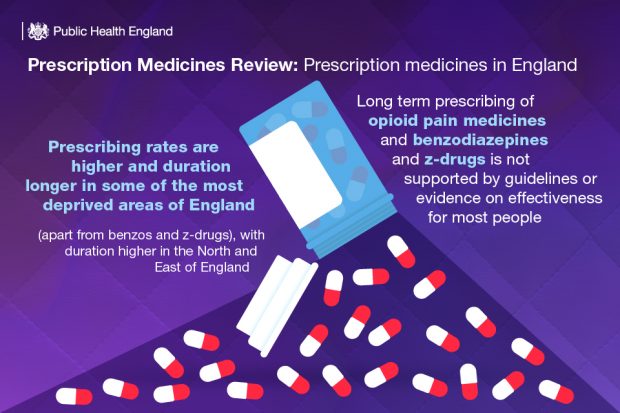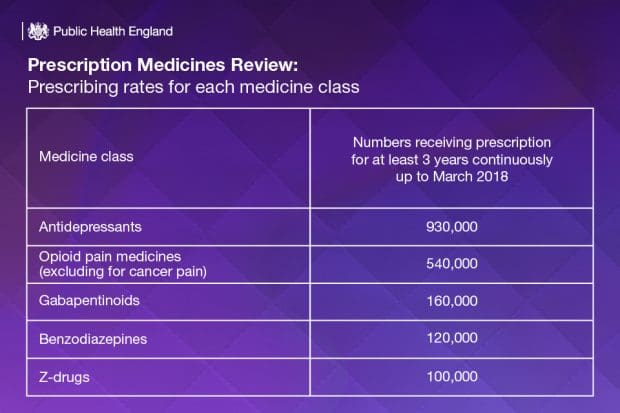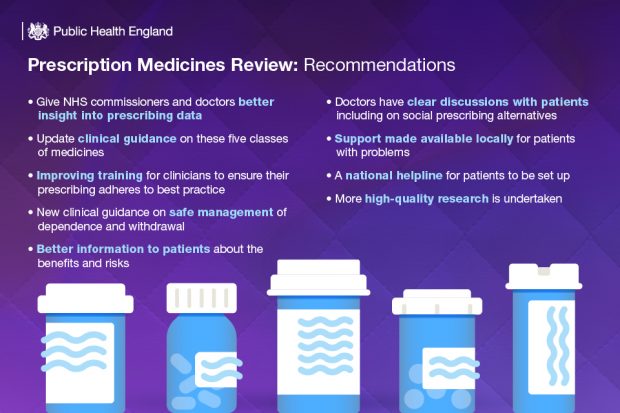-
Call Us: 0330 111 2015


Jump to a section ▼
› Introduction
› Side effects of long term use
› The solution
› Prescription drug detox
Speak with our admission team
Call now on 0330 111 2015We already know that abusing prescription drugs is neither good for our body or our brain. However, health implications and drug dependence can occur through the mismanagement of prescribing addictive controlled drugs.
Ultimately, legitimate long term prescriptions for prescribed drugs have to be reviewed and authorised by a doctor. Most of us trust our doctors to know what is best for us, but what if this isn’t always the case?
Most Class C controlled drugs are only indicated for the short term treatment of physical and mental health conditions. This is because they quickly cause the body to develop drug tolerance and dependence. They also have a moderate to high potential for abuse.
Public Health England called for an urgent review of the following types of prescription drug medications at the end of 2019. These powerful medications are also amongst the most commonly abused prescription drugs.

Source – Public Health England
Evidence strongly indicates that guidelines for safe prescribing of many controlled drugs are not being adhered to in many cases.
As a result many people are taking long term prescriptions for drugs that are only intended for short term treatment.

Source – Public Health England
There is very little scientific evidence to support the pharmaceutical effectiveness of the drugs under review in the long term management of many of the conditions they are prescribed for.
Patients who are issued prescriptions for prolonged periods of time become reliant on the effects of the drugs as a way of coping. These people, along with those that regularly abuse prescription drugs, suffer both physical and psychological withdrawal symptoms when they try to stop taking them
Staying on a prescription of certain medications for longer than guidelines puts the patient at risk of experiencing unwanted and sometimes dangerous side effects.
Side effects of long term prescription drug use include:
Tolerance – Higher dosages of the prescription drug are needed in order to continue benefiting from ts pharmacological effects
Dependence – The brain’s structure alters over the course of time and repeated exposure to prescription drugs in order to continue functioning. Reducing or stopping the prescribed drug will alter the brain’s chemistry rapidly, resulting in withdrawal syndrome
Drug resistance – Eventually the prescription drugs will have little or no effect, except to hold off withdrawal symptoms. Patients often become resistant to the drugs effects when they are on a long term prescription. When this happens many patients end up being prescribed stronger drugs in addition. This often results in a physical dependence to more than one prescribed drug
The original problem is never resolved – The condition for which the prescription was originally issued is only being symptomatically treated rather than the cause of the complaint being resolved. This is especially true of medications prescribed to treat mental health illnesses, where therapy should be combined with medication for optimum results.
Increased sensitivity to pain – Evidence suggests that opiates only have pharmacological benefits for a period of three months. Beyond that they have very little effect. As a result the patients pain may well worsen
Alternative holistic and complimentary treatments are not explored – Patients may well benefit from holistic and complementary treatments and therapies. Even in chronic pain related conditions, cognitive behavioural therapy (CBT) and mindfulness have been proven to be an effective tool in pain management. Other holistic and complimentary therapies such as acupuncture, reflexology and counselling can all help with long term mental health and pain related conditions.
Development of anxiety and depression – The effects of prescription drugs on the brain when used for prolonged periods of time can damage the brains pleasure/reward system. This results in the patient becoming depressed and anxious as there is an imbalance in the brains chemistry and they are no longer able to feel pleasure through activities they used to enjoy.
Self medicating – A patient on a long term prescription (that stops having the desired effect) is more susceptible to self medicating through abusing drugs and alcohol.
Development of other long term health complaints – Many prescribed drugs that are controlled have side effects that can affect the brain, stomach, liver and kidneys. Staying on a long term prescription can lead to the development of additional health problems
Quality of life suffers – Patients who are no longer responding to medication they are prescribed will find that other areas of their life begin to suffer as a result. Being in acute physical or mental pain vastly reduces quality of life. It may also start to affect their ability to work, their social life and their relationships with others
From a medical perspective Public Health England are introducing new measures to safeguard against long term prescribing of certain medications where the risks outweigh any benefits. This is at least reassuring moving forwards.

Source – Public Health England
Whilst PHE have recognised the need for tighter monitoring of the prescribing of certain drugs, this does not necessarily help those that are currently on a long standing prescription.
Prescribed medications that are under review are extremely difficult to withdraw from, especially in the community, even with the support of your doctor. This is another reason why there are are such high numbers of patients dependent on long term prescriptions.
Patients who have been on a prescription of one or more of these medications for a prolonged period of time (i.e many months or years) will not only require a medically assisted detox but will also require counselling and behavioural therapy. Mentally they will need to learn how to live without the drug they have become dependent on and quite possibly addicted to.
 Detox safely in our medical facility
Detox safely in our medical facility
 Free collection
Free collection Future-proof
Future-proofWe at Delamere recognise that not everyone becomes dependent on prescription drugs through abusing them. A high proportion of patients we treat are taking long term prescriptions of addictive prescribed drugs.
If this describes you or someone you love, we can help. Delamere provide a full medical detox to make detoxing from prescribed drugs as comfortable and safe as possible.
In addition to receiving 24/7 medical support and monitoring you will also benefit from our evidence based treatments delivered by some of the UKs top BACP registered counsellors and therapists.
We will not only help you to stop taking prescribed drugs that are no longer benefiting you but will also show you how to rebuild your life using healthier coping strategies and methods of managing your condition

Struggling with prescription drug addiction? Take action today…
For more information speak to our team about how we can help you grow beyond addiction and find residential treatment programmes today.

References
Start your recovery journey by calling our admissions team today.
Confidential. Straightforward. Friendly.